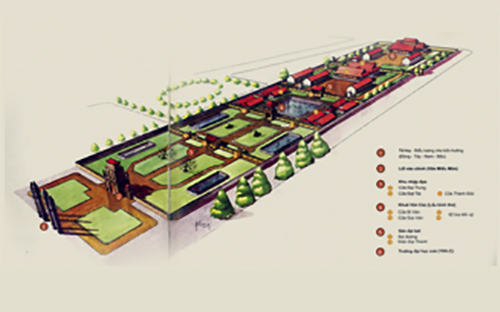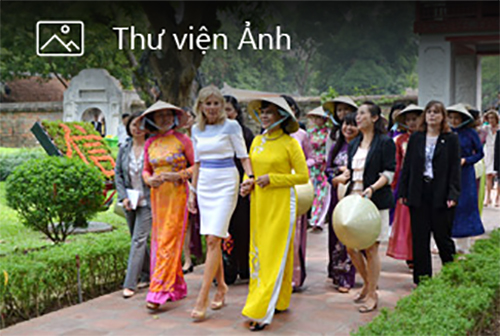CONFUCIANISM AND THE ESTABLISHMENT OF VAN MIEU – QUOC TU GIAM (TEMPLE OF LITERATURE – FIRST NATIONAL UNIVERSITY)
Confucianism is one of the first and foremost ethical and philosophical doctrines of the ancient Chinese civilization. Confucian doctrine was created by Confucius in the 6th century B.C which was based on Zhoukung’s ideological basis. Although Confucian doctrine was founded earlier, during the reign of Emperor Wu Di (140 - 86) B.C it became the dominating ideology of the Chinese Feudal society. During a long period of 500 years, Confucianism was continuously improved and developed. The quintessential values of this doctrine are reflected in the Four Books (Great Study, Golden Means, Analects, Mencius) and the Five Classics (Book of Change, Book of Odes, Book of Rites, Book of Annals, Book of Spring and Autumn).
Created during the troubled background of the late Spring and Autumn period, the core of Confucianism was therefore emphasized to organizing society and to stabilize social order. Confucianism was aimed at building an ideal man, the so called “superior” man. First, the superior man must know how to “educate the self” meaning “improving the self”, then, “organizing the family, governing the State, and ruling others”. Confucius considered the principles of rectification of names, three bonds and five constants as key virtues for all ethical behavior, political conduct and social stability. The three bonds consist of three relationships: King - subjects, father - son, husband - wife. The five constants mean five key virtues that gentlemen should preserve: benevolence, righteousness, proper rite, knowledge, loyalty. According to Confucianism if everyone obeyed these principles, society would not be in trouble.
Confucianism is also one of the most powerful doctrines. It has been spread and has greatly influenced, not only in China but also in East Asia and South East Asia, including Vietnam. Confucianism was introduced into Vietnam in the early Christian era during the period of domination by the Northern invaders as a tool to assimilate the cultures of the Northern people of the ruling policies. As a result, Confucianism firstly penetrated the upper and ruling classes. Gradually, mixed in different ways, Confucianism was fused with other doctrines, religions and beliefs of the native cultures.
By approximately the 10-11th century in Vietnam, the ideology of “Tri religious Integration” (Buddhism, Taoism and Confucianism) was officially created, but with its hidden role of Confucianism. Because of the historical background of the 10-11th century, especially after the great event of King Ly Cong Uan when he transferred the capital from Hoa Lu to Dai La and renamed the capital as Thang Long (soaring dragon), an urgent requirement was made up at that time to build, consolidate and develop an independent centralized monarchy. The Ly Kings, clear sighted, immediately became aware of the situation and found it necessary to get a solid ideology for the apparatus of government and a good choice of direction to stabilize society. The Ly Kings began to pay attention and realize the importance of Confucianism. Dai Viet Su Ky Toan Thu (Great Viet Complete History) written by the historian Ngo Sy Lien, reports on this great historical event: “In Autumn, in the 8th lunar month, in the year of Canh Tuat, the 2nd year of the reign of Than Vu (1070) under the King Ly Thanh Tong, Van Mieu (Literature Temple) was built, the statues of Confucius, Zhoukung and his 4 closest disciples were carved and the portraits of 72 Confucian sages were drawn. Worshipping ceremonies were held in four seasons of the year” and the establishment of the Temple of Literature marked the emergence of Confucianism as a cult.
Moreover, the Ly dynasty started to develop the education and examination system to train talented men and recruit capable civil mandarins for its administrative apparatus. In Summer, in the 4th lunar month, the year of Binh Thin, the 1st year of the reign of Anh Vu Chieu Thang (1076), King Ly Nhan Tong ordered the construction of Quoc Tu Giam (College for the Sons of the Nation - National University), and literate mandarins were selected as its students. The establishment of Van Mieu - Quoc Tu Giam under the Ly dynasty laid the basic foundations for the Confucian education and for the examination system later on. Since then, Van Mieu - Quoc Tu Giam has become an avenue for the gathering of the quintessence of Confucianism and that of Vietnam.














 Guide to finding the way
Guide to finding the way
